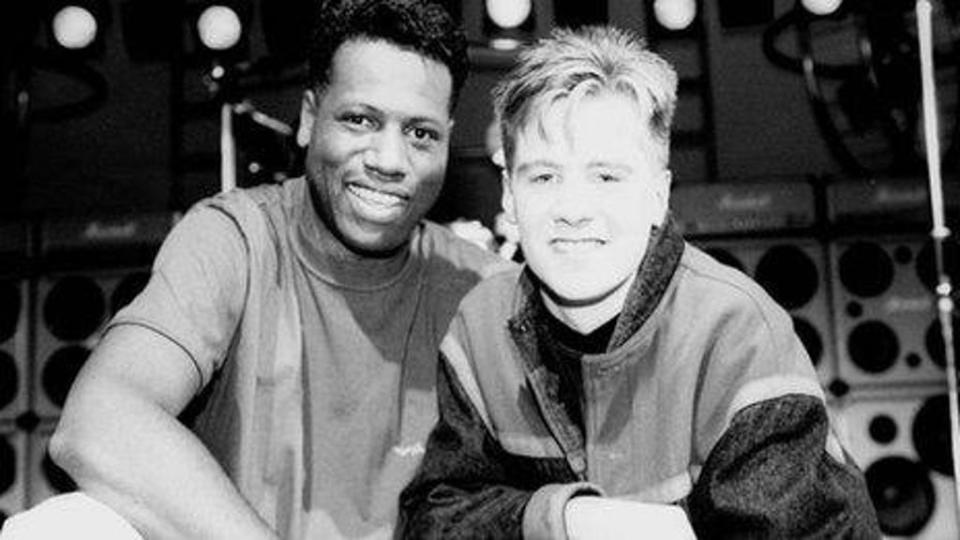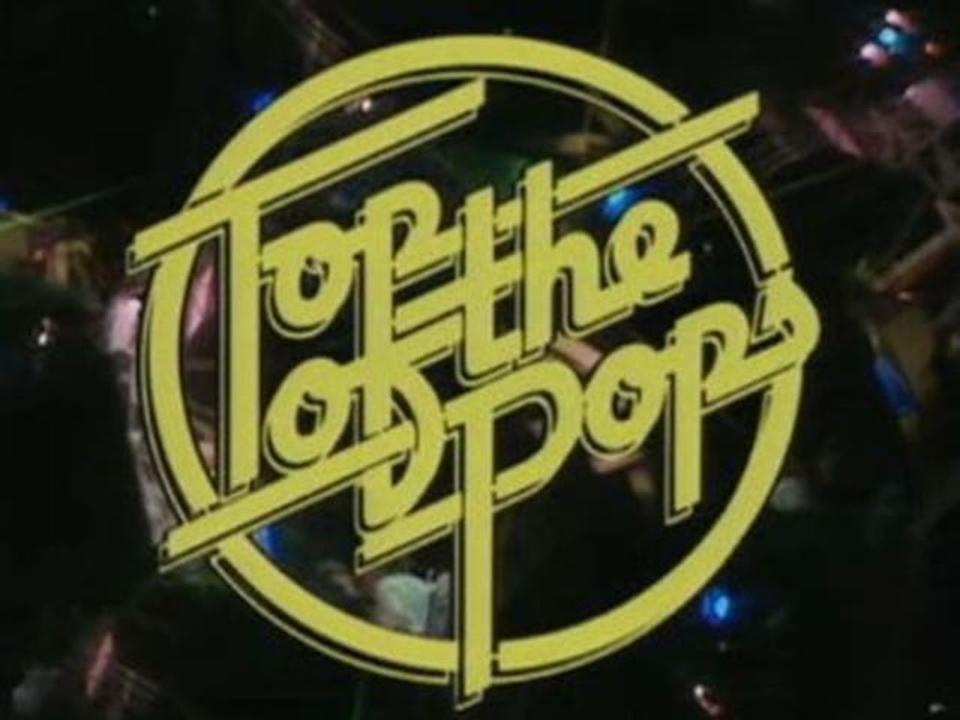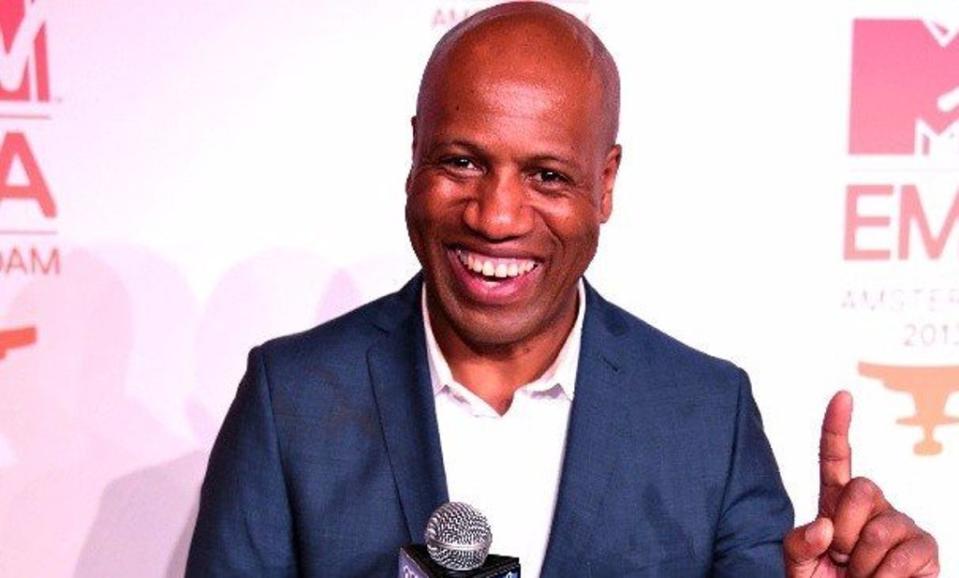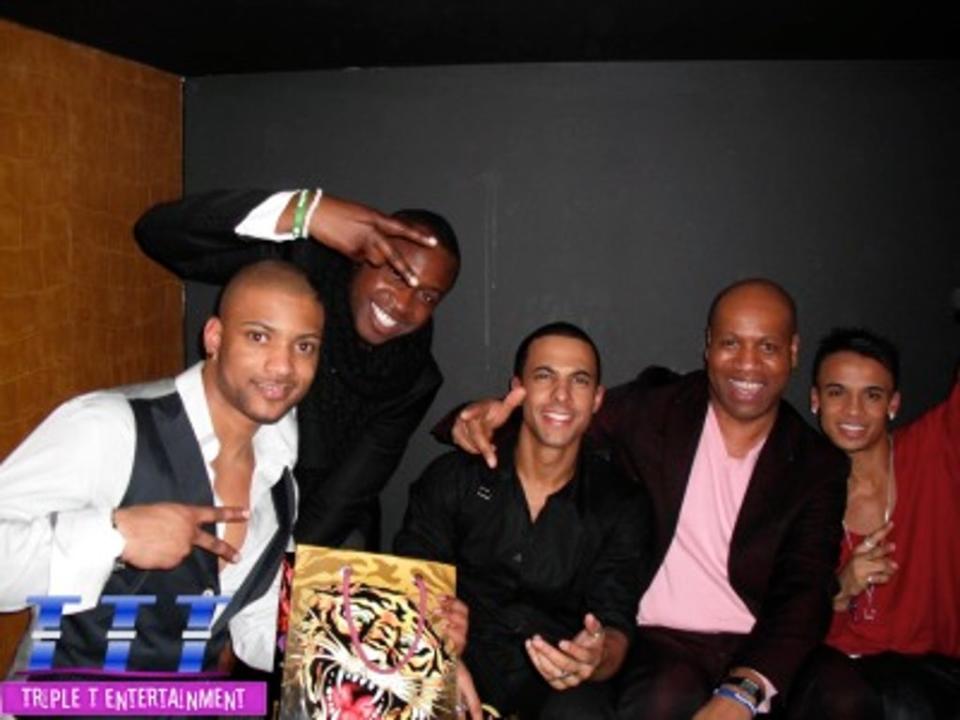Top of the Pops’ Tony Dortie: ‘Black representation on TV is the best it’s ever been’

- Oops!Something went wrong.Please try again later.
“I kept thinking, ‘This is not real! This is like the best party I’ve ever been to,’” says Tony Dortie, a glimmer of nostalgia flashing across his brown eyes as he recalls landing his dream job on Top of the Pops. “‘And I’m getting paid for it!’”
In 1991, aged 28, Dortie became famous overnight when he began presenting the BBC’s flagship entertainment programme. “I had no idea of any of the politics, none of it – I hadn’t done a pilot, rehearsals or anything,” says the now-58-year-old, smiling from ear to ear in Los Angeles as palm tree leaves billow behind him. “It was a brilliant experience working with some of the biggest bands and artists in the world.”
He loved the job, he says. “I think the BBC just wanted something new at the time – an injection of something more relevant to the audience. You could not get a more different person, with a more different character, from a more different background, to anyone at Radio 1 than myself.”
It was a far cry from the realities Dorties faced within the inner city borough of Hackney where he spent many of his childhood years. From posing for fun photos with Mariah Carey and her back-up singers and bonding backstage with David Bowie, to talking about football with Elton John and bantering with the Eastenders cast, each day was as dazzling as the one before.
Yet working within a white-dominated media industry took a toll. Dortie’s experience was blighted by what he describes as “professional bullying” and racism.

This appeared to be the norm back in the day. On one occasion while working at Capital Radio in the late 1980s, fresh from achieving a diploma at the National Broadcasting school, a senior controller told him that Black people were not suitable to front music programmes outside of R&B and hip-hop. After then landing a job at a commercial radio station in Kent, Dortie found out that he was being paid 70 per cent less than two other white people with the same experience as him. He quit.
Later, while presenting a children’s TV programme entitled UP2U alongside Anthea Turner, Dortie complained about a well-known person referring to Asian people using a racial slur – and a manager told him not to be a “trouble maker”.
He didn’t let it stop him. Kicking off the 1990s in fine style, Dortie was hired for TOTP by Stanley Appel, BBC Television’s director of light entertainment at the time, who famously overhauled the show, bringing to an end the tradition of BBC Radio 1 DJs hosting it.
This, according to Dortie, rubbed some of the discarded cohort up the wrong way. This sense of disgruntlement was evident within the workplace, where a culture of “bullying” was rife.
“There were a faction of Radio 1 DJs who had something against me as a Black man from a working class background fronting the show,” he says. “This was an environment where people from working-class, council-estate backgrounds, weren’t the traditional examples of TV hosts, never mind being Black. So I had to deal with a lot of jealousy from all angles.
“TOTP was the backbone of Radio 1; for three years, presenters and some staff took every opportunity to spin negativity, and you couldn’t complain because if you criticise, then it becomes a case of subjectivity – whether you’re seen as a good person or bad person [for raising a genuine issue]. But there was a diatribe about me being bitter and unpleasant person which would be said on the radio by these people.”

“A lot of professional bullying went on,” Dortie adds. That bullying included briefings against him to journalists at The Sun and The Mail newspapers, he later learned from these reporters.
“I didn’t understand how the media worked then or the fact that you could be a Radio 1 DJ, call someone at the newspaper, and leak a story putting out negativity about a person who has upset you because they’ve got the job you want. Maybe I wasn’t going to the right events, lunches and shaking the right hands. Back then, you needed to be packaged and play the game.
“I do think there was racial discrimination during my time on TOTP and when I left. I didn’t have an agent [like the others] because no one wanted to come near me, so what does that tell you?”
The lack of diversity on-screen – save for a few ethnic minority personalities and hosts who also presented some TOTP shows during that era – also presented obstacles, Dortie says.
“There weren’t many Black faces on TV at the time; I could count the likes of Andi Peters, Mr Motivator, Trevor McDonald and Rusty Lee as inspirations. Plus, the overall lack diversity motivated me to make sure that Hackney was represented.”
Sure enough, the Sussex-born host persevered with his job, elated and even grateful to be there. To his dismay however, he was abruptly sacked, without any reason, two days before his final show in 1993.

Now, the BBC is set to broadcast new documentaries, The Story of 1991 and The Story of 1992, offering an insight into TOTP across those years, including input from stars of the time and presenters including Dortie.
However, reflecting on his time on the programme is bittersweet for the father-of-one given his experiences. It is only now that he is in a place where he can “accept” Top of the Pops, after almost 30 years.
“I have not spoken about it, watched it or had anything to do with it until recently,” he explains. “I’ve done red carpet interviews for American TV, I have a very successful YouTube channel, interviewed football stars and celebrities for friends at events – and never mentioned TOTP on my CV.”
So, how did his TOTP tenure come to an end?
“I don’t know ‘til this day what the reason was. I just got told, ‘You’re not doing it anymore’ two days before my last show.” He sighs.
“There was no letter or anything. It was a really weird scenario. Nobody has any God-given right to do any job but when you come off from such a high-profile role, on top of my shock at being let go, there was no after-care.”

“You’ve never seen me on any look-back programmes or heard references to me since my last day,” he adds, describing this as a “whitewash”.
The Independent has put these claims to the BBC and a spokesperson confirmed that the enquiry is being examined.
Fortunately, according to Dortie, diversity in media has improved since the 1990s.
“The progress has been good, I must say; Black representation on television is the best it’s ever been,” he says. “Moreover, you’ve got platforms which allow you to make a very good living, raise your profile, with no one controlling you. I also think the monopoly has changed with all of the streaming giants in the business too.”
However, there’s still a way to go. For example, a recent survey by Black Lives in Music revealed that UK music industry is blighted by systemic racism, with Black women particularly affected.
“There are gatekeepers in every level of society, whether it’s in sports, music or TV,” says Dortie. “I admire the fact that Raheem Sterling has spoken about issues in his own organic way, which you’ve got to listen to.”

He continues: “I wish I had that level of confidence at the beginning in the way Sterling has. There were so few Black figures in the industry to look up to and I was really aware of being in a position where I didn’t want to rock the boat. I felt the level of importance, the desire to keep the job also because of what representation meant to other people.”
In the years since his TOTP days, Dortie has set up his own production company, Triple T Entertainment, and appeared on various popular entertainment networks such as ITV and MTV. As a host, he’s stood on numerous showbiz red carpet for US television platforms. Now, he runs a successful YouTube channel where he provides commentary on American politics.
Overcoming adversity, while inspiring and entertaining others, is central to Dortie’s ongoing legacy. He was abandoned by his father by the age of 13 and spent a great deal of his adolescent years doing a newspaper round, working on the doors of Arsenal football club and shoplifting for food, to make ends meet.
“I’m the number one Black British opinion maker and commentator on American politics,” he says. “I’d tell anyone this: if you have something within you [that you’d like to accomplish] – do it.”
When I ask Dortie about his own motivation, he pauses. “When you come from the background that I have, where you’ve been broke and abandoned as a child,” he says, “you’re motivated and never want to be poor again. It was a difficult time. I always wanted to better myself as an inner city child... it’s like something out of Oliver Twist!
“I never wanted to go back to those days again.”
This Friday at 8pm on BBC Four, Tony Dortie and Mark Franklin present TOTP, first broadcast on 17 October 1991, featuring Bryan Adams, Slade, Enya, Lisa Stansfield, U2, Dannii Minogue, Scorpions, Paul Young and Monty Python.
Read More
What are the odds you could win £1.7m betting online?
Is this children’s song really a lesson in violent revenge?
LGBT+ art has been hiding in plain sight longer than you'd think
More women have accused Harvey Weinstein of sexual assault
Ashley Judd says she escaped Harvey Weinstein's advances by striking an Oscar 'deal'

